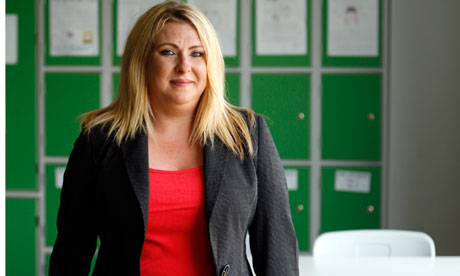
Laura Pollock, a graduate who is now teaching at St Edmund Arrowsmith school in Whiston, near Liverpool, thanks to Teach First. Photograph: Gary Calton for the Observer
It began as a small enterprise launched by a few educational idealists to get top graduates to teach in deprived areas. But just a few years later and figures show that Teach First is now Britain's single biggest recruiter of university leavers, ahead of banking, a civil service fast-track scheme, the army and leading graduate employers including PricewaterhouseCoopers, IBM and KPMG.
The initiative took on 1,261 handpicked graduates this year, 80% from leading Russell Group universities. All will have six weeks of intensive training before being sent to schools in underprivileged areas where they will work for two years. The idea is that highly motivated and ambitious young teachers will raise the aspirations of pupils who need it.
"It's a remarkable achievement that Teach First has hired so many top graduates this year, overtaking recruitment at long-established graduate employers," said Martin Birchall, managing director of High Fliers Research, which tracks the graduate labour market.
The results come as Teach First plans to expand, with new schools being added in Wales and England this year, and the aim of taking 2,000 graduates a year by 2015. Its first intake, just over 10 years ago, was 183.
"It's great news and great for the problem that we are trying to solve, educational disadvantage," said James Darley, director of graduate recruitment at Teach First, which was started by American-British entrepreneur Brett Wigdortz in 2002.
So what's the explanation of the organisation's success?
"A third of our intake are themselves the first generation in their family to have gone to university; 20% were on free school meals and perhaps benefitted from a special teacher and so a lot of them are motivated to come back to school and do it themselves.
"We never hire anyone who is going to go into schools and say 'I'm coming to change the world and I'm here to fix everything'. Its about humility, respect and empathy.
"I'm sure that a lot of teachers are wary ? it's something new after all ? but we have had graduates from investment banks to clergy who are bringing not just idealism but also life experience with them."
Last year a study from the Institute of Education in London suggested that bright 15-year-olds from poorer homes lagged more than two years behind their richer peers. The socio-economic dimension to educational achievement was starker in England and Scotland than many other countries, researcher Dr John Jerrim found.
The government's own figures show a big gap in performance between pupils from disadvantaged and better-off backgrounds, with only a third from poorer families achieving the benchmark of five GCSEs at grades A to C. The national average is 58%. University attendance remains a huge marker of the divide in our society, with only 19% of young people from deprived areas of England going to university while 57% of those living in more affluent areas do, according to figures from 2010 from the Higher Education Funding Council for England.
"A lot of people who might not have come from more deprived areas are unaware of the inequalities in our society, and that's why we are out there in universities trying to show young people where the problems are in their society," said Darley.
"Once they see the problem, they are responding with hard work and enthusiasm. It says a lot more about this generation of graduates than they are sometimes given credit for," Darley added.
Source: http://www.guardian.co.uk/education/2013/jul/20/graduates-teach-deprived-schools
Robert Bork mark sanchez Mayan End Of The World Olivia Black World Ending 2012 gossip girl Ink Master
No comments:
Post a Comment
Note: Only a member of this blog may post a comment.